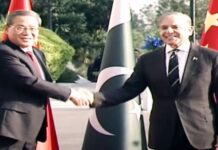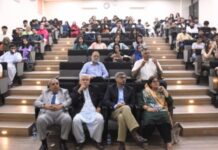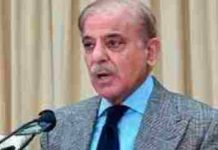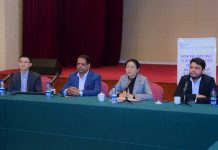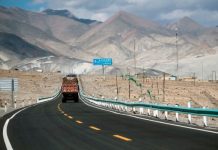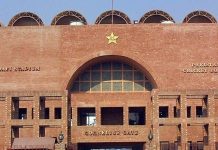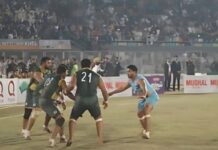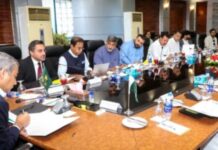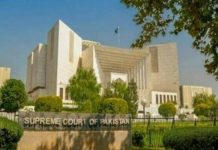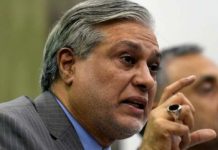ISLAMABAD, Jun 22 (NNI): After a day-long drama on Thursday which saw the nine-judge Supreme Court of Pakistan larger bench, formed to hear a set of petitions against the trial of civilians in the military courts, shrank to a seven-member bench, the apex court summoned record of all those arrested throughout the country after May 9 violence which broke out after arrest of former prime minister and PTI Chairman Imran Khan.
The launch of the proceedings were hit by the objections raised by Justice Qazi Faez Isa and Justice Sardar Tariq Masood, who declared that the larger bench should not take up the petitions until the apex court decides the case about the Supreme Court Practice and Procedure Act.
The CJP’s order seeking record of all arrests came as a new seven-member bench, reduced from a nine-member bench, resumed hearing a set of petitions challenging the trial of civilians in military courts.
Earlier in the day, a nine-member bench comprising Chief Justice of Pakistan (CJP) Umar Ata Bandial, Justice Isa, Justice Masood, Justice Ijazul Ahsan, Justice Syed Mansoor Ali Shah, Justice Munib Akhtar, Justice Yayha Afridi, Justice Sayyed Mazahar Ali Akbar Naqvi and Justice Ayesha Malik had taken up the case.
A new Supreme Court seven-judge bench resumed after lunch hearing of the petitions against the trial of civilians in military courts after the first nine-member larger bench was dissolved following objections raised by Justice Qazi Faez Isa and Justice Sardar Tariq Masood.
The new bench has been constituted after excluding Justice Qazi Isa and Justice Tariq Masood.
Earlier, nine-judge Supreme Court larger bench formed to hear petitions against the trial of civilians in military courts was dissolved after Justice Qazi Faez Isa and Justice Sardar Tariq Masood declined to sit on the bench.
As the proceedings were set into motion on Thursday, Justice Qazi Faez Isa, who was formally appointed as the country’s next chief justice a day earlier, said that he could not sit on this bench until the apex court decides the case regarding Supreme Court Practice and Procedure Act – which aims to deprive the office of the chief justice of Pakistan (CJP) of powers to take suo motu notice in an individual capacity and which has since become law.
Justice Sardar Tariq Masood endorsed Justice Qazi Isa’s views.
Former CJP Jawad S. Khawaja, eminent lawyer Aitzaz Ahsan, Karamat Ali and PTI Chairman Imran Khan, in their petitions filed in the apex court, had prayed to the court to declare the trial of civilians in military courts unconstitutional.
The CJP had formed the bench yesterday (Wednesday). Surprisingly, the bench also included Justice Qazi Faez Isa, who for the first time became member of a larger bench, headed by the CJP Bandial himself.
CJP-in-waiting and Senior Puisne Judge of the Supreme Court Justice Qazi Faez Isa said he “did not consider the nine-member bench a bench”, with Justice Tariq Masood throwing his weight behind him.
Justice Qazi Isa remarked that the court should first decide the case about Supreme Court Practice and Procedure Act, 2023, and then constitute new benches. “I will not accept this court until a decision is issued on the Supreme Court Practice and Procedure Act. All decisions are unconstitutional until the verdict on this act is issued,” Justice Isa maintained
However, he made it clear that he was not recusing himself from the bench.
Justice Tariq Masood, on his part, said the top court cannot form a bench until the Supreme Court Practice and Procedure Act is decided.
Responding to the judges’ concerns, CJP Bandial insisted that he had constituted the bench in line with the law. “Two senior judges have opted not to hear the case, we respect them and we also cannot move forward now. We will find a way to take up these petitions,” he added.
The bench then exited the courtroom, and the hearing was adjourned. There were no official word on the fate of the larger bench though the Supreme Court staff later informed that the hearing will resume at 1:30 pm
Earlier, Justice Isa remarked that he was surprised to see his name on the cause list for this hearing at 8pm on Wednesday (a day earlier). I am not a part of the bench hearing the case related to Supreme Court Practice and Procedure Act so I will not make any remark about it,” he added.
Justice Isa said that the Supreme Court rules should be looked into first. Article 175/2 of the Constitution gives the court powers to conduct a hearing, he said, adding earlier a suo motu notice had been fixed for hearing under his bench.
“I said in my verdict that the rules should be made in Article 184/3 of the Constitution. It was a surprise and shock that on March 31, SC registrar Ishrat Ali issued a circular to ignore the March 15 order of the Supreme Court,” he said, questioning if this was the importance of a decision made by the apex court.
Justice Isa said that after this a six-member bench was formed which endorsed the circular and withdrew his decision. “My friends are certainly more capable than me, but I will decide according to my faith,” Justice Isa declared.
He then raised the question of why no judge from the bench hearing the main case was a part of the six-judge bench for review. He mentioned that his note on the six-member bench was removed from the court’s website.
Justice Isa said the CJP had asked him on May 16 whether he wanted to remain restricted to chamber work. Explaining why he preferred chamber work, Justice Isa said a law had been made for the constitution of benches. “I am not pointing fingers at anyone, but I was caught between the choices of joining the bench or following the law,” he made his point. “I believe the law can be rejected, not suspended,” he said, in reference to the stay order on the law clipping CJP’s powers.
Lawyer Sardar Latif Khosa and Aitzaz Ahsan, however, pleaded the judges to listen to the matter at hand. “If you don’t listen to the case, what will happen to the country’s 220 million-strong population?” they asked, urging them to keep issues aside similar to familial disputes. “The Supreme Court is not someone’s house, it is a court,” Justice Isa responded.
The hearing was subsequently adjourned after all the judges left the courtroom. However, CJP Bandial decided to move forward with hearing the case and formed a fresh seven-member bench, excluding justices Isa and Masood.
As the hearing began, Justice Shah said that anyone who had reservations regarding the seven-member bench should make it known right away. Ahsan and Attorney General of Pakistan Mansoor Usman Awan stated that they had no objections.
CJP Bandial said that some benches use to go to the provincial registries during court holidays. “Keep all these things in mind,” he said.
The PTI chairman’s lawyer, Shoaib Shaheen, said that some objections were raised on their petition. The CJP responded saying there were certain things of a “political nature” included in the plea. “We don’t want to hear that right now. Right now the focus is military courts,” Justice Bandial said. Shaheen, however, urged the court to include the PTI’s plea among those being heard. CJP Bandial responded by stating that the court would see.
Aitzaz Ahsan’s lawyer Latif Khosa then began his arguments and said that after invoking of Article 245, the high courts’ jurisdiction under Article 199 had ended. However, Justice Afridi pointed out that the notification for the requisition of armed forces had been recalled. Khosa then said that the Formation Commanders Conference had stated that there was “irrefutable evidence” regarding the events of May 9.
“Did the press release say trials would happen in military courts due to irrefutable evidence?” CJP Bandial asked, to which Khosa replied in the negative.
The lawyer then proceeded to read the handout issued after the meeting out loud in court, at which the CJP told him to only read out the relevant paragraph. “The relevant paragraphs state that the perpetrators will soon be brought to justice under the Army Act,” Khosa said.
Justice Bandial then asked whether the trials of civilians in the country’s military courts had commenced. Khosa said they had started. The lawyer also highlighted that the handout issued by the National Security Committee also talked about “irrefutable evidence”. “Either a colonel or a brigadier will conduct the trial of a civilian,” he said.
The lawyer further said that the federal cabinet had also endorsed the statement issued by the Inter-Services Public Relations (ISPR) in this regard. “The country’s military leadership gave a unanimous decision that there is irrefutable evidence,” he said.
“The Formation Commanders Conference said there is irrefutable evidence so how will a colonel issue a different verdict during the trial?” he asked. At the same time, he made it clear that he was not asking for the perpetrators to be released. “I have no sympathy for those who attacked military installations,” Khosa said. Those who have committed crimes should be punished in accordance with the law, he said.
However, Justice Shah urged the lawyer to show the court that trials in military courts had in fact begun. Khosa then read out the verdicts issued by anti-terrorism courts for handing over suspects to military courts.
Justice Shah then asked if any of the affected persons had moved the apex court. “I have no such information,” Khosa responded.
Justice Afridi then wondered if anyone had challenged the laws under which trials were to be conducted in military courts. “Can the laws regarding military courts be challenged?” asked Justice Ayesha. “Who will listen to a case against the Army Act and the Official Secrets Act?” Khosa asked.
Justice Ayesha then asked the lawyer to apprise the court about the Army Act and the rules of military courts. Justice Afridi also asked Khosa to inform the court about the names of those sent for trial under military courts.
Justice Naqvi said that the anti-terrorism courts were already empowered to hear the cases that had been registered. “That is also our argument: cases should be heard in anti-terrorism courts, not military courts,” Khosa said. He said that around 9,000 people were arrested “under the pretext of May 9”.
CJP Bandial, however, said that the court wanted to stick to the facts. He said that countless names were included in the cases that were registered. “Why were the names of some policemen included in the cases?” he asked. “How many people were booked and how many were arrested?” Justice Shah also asked.
Khosa said that around 4,000 people were arrested across the country on May 10, adding that cases were registered against PTI’s Shah Mahmood Qureshi, Murad Saeed and Hammad Azhar.
Justice Shah said that a request is given to the court or the magistrate regarding trying civilians in military courts. He said that the courts may have had a reason for allowing the cases to be transferred. “If the Army Act does not apply to civilians, how did anti-terrorism courts allow the cases to be transferred to military courts,” asked Justice Ayesha.
“Under which law or reason was permission given to transfer civilians’ cases to military courts?” Justice Shah asked.
Justice Afridi also pointed out that the documents Khosa had attached with Ahsan’s plea were incomplete. He again asked the lawyer about the number of cases sent to military courts.
Justice Shah also asked if a discussion had taken place in the anti-terrorism courts earlier regarding trying suspects in military courts.
Advocate Khosa replied that in several instances neither the suspects nor their counsels were present in the courtroom. “Will the prosecution then challenge such a decision?” the judge inquired, to which Khosa said that his case was about not trying civilians in military courts.
Here, Justice Akhtar asked, “Can the case be heard in the anti-terrorism courts under the Official Secrets Act?”
Advocate Khosa replied in the affirmative.
Meanwhile, Justice Ayesha remarked that only “their own people” can be extradited to the military courts, adding that the same was not applicable to civilians. “This is exactly what our case is about. Trials of civilians cannot be held in military courts,” Khosa said.
Justice Akhtar also inquired if anti-terrorism court judge could decide whether a case fell under the Army Act. “Civilians have a constitutional right to approach the high court for fundamental rights in military courts,” he pointed out. He also noted that a matter pertaining to fundamental rights could be brought to the SC.
Justice Afridi noted that the anti-terrorism courts had handed suspects to the military courts under Section 549(3). “I am sorry, but sub-section three of Section 549 does not exist on the Ministry of Law’s website,” Justice Akhtar highlighted.
Khosa then asked the court to issue a stay on trying civilians in military courts. However, CJP Bandial remarked that the answer for all issues did not lay in “issuing a stay order”. The court subsequently rejected Khosa’s request.
Addressing the AGP, Justice Bandial said that lawyers were being harassed. He said that one lawyer was “kidnapped” for six days while another was taken to the police station. He noted that a firing incident had also taken place at Khosa’s home.
“Be it a civilian court or a military one, the accused have a right to appoint their lawyer,” the CJP said. He said that all meetings and telephonic conversations were also being monitored.
“We no longer have the right to privacy given in the Constitution,” he added. The CJP then told the AGP that the court won’t issue a verdict without listening to him.
“More than 4,000 people have been arrested. Even women were taken into custody,” he said and directed that the court should provided details about the number of people who were in civilian and military custody. The SC also sought a record of all those arrested in the country post-May 9.
The hearing was subsequently adjourned till 9:30am tomorrow (Friday). NNI








